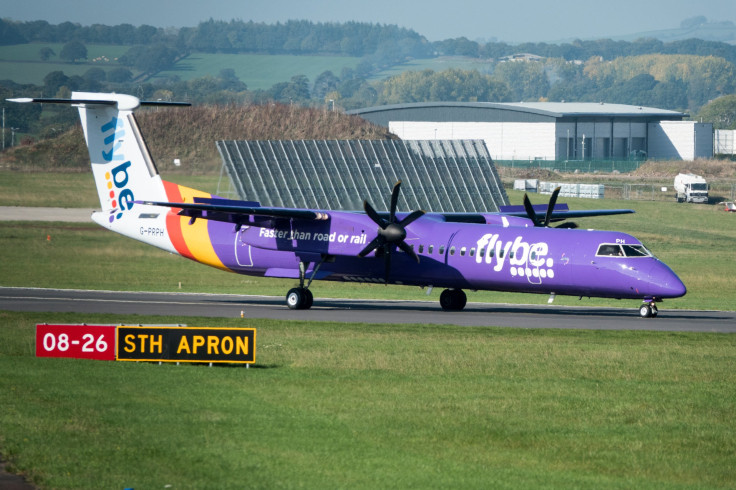UK Government May Step In To Save Ailing Flybe Regional Airline

KEY POINTS
- Flybe carries about 8 million passengers on 74 aircraft annually
- Flybe is crucial to regional airports and to people who have limited access to railways
- Flybe employs about 2,000 people
The British government said it may intervene to rescue regional airline Flybe, a debt-ridden carrier that operates more than half of the U.K.‘s internal flights outside London.
Prime Minister Boris Johnson said that while it should not be the government’s responsibility to save companies in trouble, he conceded Flybe’s crucial role in the country.
"We see the importance of Flybe in delivering connectivity across the whole of the United Kingdom," he said.
Sky News reported Tuesday that cabinet ministers responsible for finance, transport and business will hold an emergency meeting to mull over a rescue deal for Flybe.
Flybe carries about 8 million passengers on 74 aircraft annually from airports in Birmingham, Manchester, Southampton, Belfast, Cardiff and Aberdeen to other U.K. cities and Europe.
Tim Jeans, chairman of Cornwall Airport, said Flybe was "very important not just to our airport but to regions, to nations and to island communities across the U.K.”
"They provide lifeline services to destinations across the rest of the U.K. that simply are not replicated by either other airlines or convenient and affordable train services," Jeans added.
A regular Flybe passenger named Jason from Northern Ireland tweeted: "Mainland U.K. doesn't understand how vital Flybe is to Northern Ireland. As someone who travels with them frequently for work, Flybe's collapse would be a disaster for the [Northern Ireland] economy. If this happens, Belfast City Airport will have only four flight routes. Four."
Specifically, the government is considering providing short-term funding to Flybe. In exchange, Flybe's owners would be required to invest tens of millions of pounds into the company as part of any such deal.
The government also might allow Flybe to reduce its air passenger duty, or APD, on domestic routes.
These measures would potentially allow Flybe to defer a tax payment of more than $130 million for three years, save more than 2,000 jobs, and give the airline enough time to formulate a turnaround plan.
That turnaround would likely be funded by a group led by Sir Richard Branson's Virgin Atlantic, which already rescued Flybe one year ago. At that time, Virgin Atlantic, Stobart Group and hedge fund Cyrus Capital Partners paid $3.64 million for the airline and agreed to invest $130 million in the business.
APD, which is currently charged on all passenger flights from British airports, excluding some in Scotland, is one of the most controversial aspects of the proposed bailout.
Passengers on domestic flights pay about $16.90 in APD for each journey – rates are higher for longer flights and those in premium cabins. Flybe had long complained about APD, citing that it burdens domestic flyers who have to pay the levy every time they use a British airport.
But environmentalists contend APD is necessary as a means of fighting climate change.
"[The government] cannot claim to be a global leader on climate one day, then making the most carbon-intensive kind of travel -- flying -- cheaper the next,” said Doug Parr, chief scientist at Greenpeace.
Parr said on Twitter that “cutting air passenger duty encourages flying” and this measure should not be used to save a struggling airline.
Cutting air passenger duty encourages flying and should not be messed with/reduced in order to save a struggling airline
— Doug Parr (@doug_parr) January 14, 2020
IF this becomes response of govt confronting tricky industrial issue, can be little hope for UK decarbonisation effortshttps://t.co/ro910rgpV0
Jenny Bates, a campaigner for the Friends of the Earth charity, said that the types of short journeys that Flybe specializes in "are exactly the ones we need to avoid in the drive to cut aviation climate emissions needed to prevent climate breakdown. Instead the government could invest more in our rail system, helping make such trips more affordable."
Justin Francis, CEO of Responsible Travel, said: “If the government is serious about the climate crisis then the mere suggestion that we should be cutting APD is insane.
Francis added: “The bigger picture clearly calls for urgent action on soaring aviation emissions. Flybe isn’t currently looking economically sustainable and when considering whether to spend taxpayers’ money bailing them out, the government needs to carefully consider whether it’s environmentally sustainable too.”
Moreover, cutting APD would be costly for the government. The Office for Budget Responsibility expects APD to generate $4.82 billion in the current financial year.
Should the government step in to save Flybe it would mark an about-face from recent similar incidents – last September the U.K. refused to rescue travel operator Thomas Cook when it went into administration. Two years before that the government allowed Monarch Airlines to collapse.
Stefan Gossling, a sustainable travel expert at Linnaeus University in Sweden, said struggling airlines should not receive government subsidies.
“First, subsidies create overcapacity, and overcapacity reduces profitability,” he said. “Airlines have been surviving on subsidies, and if these were removed, it is likely that we would see some bankruptcies -- which I would welcome, because airlines need to become more profitable in order to deal with the second issue: the fact that air travel will become vastly more expensive if the cost of sustainable fuels is weighted in. Essentially, aviation would need to become far more expensive in order to make new, sustainable fuels economically viable.”
© Copyright IBTimes 2024. All rights reserved.




















